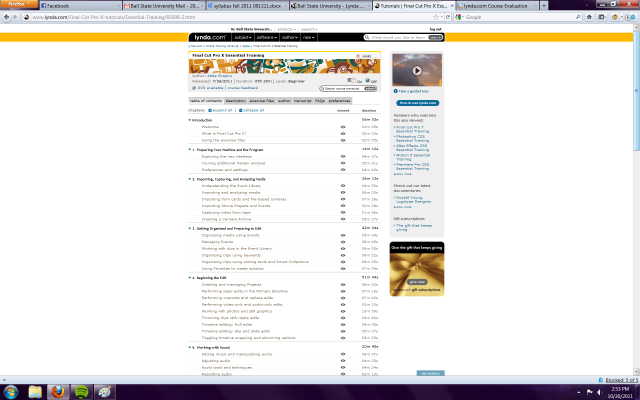As I’ve stated in many a blog before this one, the times they are a’ changing. Whether we as a species are growing and changing and adapting our technology and media to suit our needs, or just the opposite; we are a byproduct of our technology; we are changing. Our children now grow up with technologies that would have blown peoples minds 50 years ago. Where will this take us? From Augmented reality, to targeted advertising, we seem to be witnessing a fundamental shift in the way we interact with the world and vice versa.
Augmented Reality
Dan Cooper from the Center of Media Design recently visited our class to speak about augmented reality. Augmented reality is basically a blending of the physical and virtual worlds. Dan showed us a video that will revolutionize repair work. He showed us a video in which a BMW mechanic wore augmented reality goggles. The goggles overlay in 3d space the parts of the BMW under the hood. They then showed him exactly which parts needed to come out, exactly where the screws are in 3d space, and the proper tool for the job. I imagine a world where this applies to more than just BMW’s. This technology could be applied to anything from simple home repairs to brain surgery.  .
.
Mobile Marketing
In our class readings, we read about the development of an augmented-reality contact lens. In the future this could be used to help the disabled, particularly, deaf people. With enough processing
power, this device could translate speech in real-time to a deaf individual, bringing them right into the conversation. Smart Phones are the likely choice for early augmented reality applications.
Smart phones are becoming more prevalent in society every day. Eighty-four percent of American adults own cellphones; 38 percent of those people own smartphones. This is a huge market that advertisers should be and are taking advantage of.
People are no longer relying on computers for their internet and information needs. People are on their phones constantly. The companies now have access to the user’s geographic information, and can now tailor the advertising to their specific location. Think about it, when is the last time you used a physical phone book to look up a number? I certainly can’t remember. Just a few days ago I left my keys at the local Red Lobster. All i needed to do was pick up my android and say “call Red Lobster, Muncie”, and I was connected. Our phones do a lot for us, and we rely on them for practically everything. This is why mobile marketing is the future of advertising.
When you consider the fact that there are four times as many cellphones in the world as there are computers, this is not a surprising trend. Some new innovations are on the way, such as using your mobile phone o pay at a cafe, and text coupons. The future of advertising is already in your hand or pocket.
This is creating a problem in the job market. With the rapid growing rate of the expansion of mobile usage, there is now a shortage of people who have the necessary skills to fill job openings among these technology-rich ad agencies. According to our readings, universities are not giving students the skill-sets necessary to enter these new technological marketing jobs. Entry-level positions in this field can fetch up to $100,000 annual salaries right out of the box.
Interactive Design
A few weeks ago our class had the pleasure of receiving a guest lecture from Megan McNames, assistant director of Journalism Workshops at Ball State University, where she also teaches web design and interactivity for the Department of Journalism and Digital Media Minor. Ms. McNames gave an enthralling lecture about the importance of design interactivity. The most interesting thing that she mentioned was the implementation of eye tracking software to help better design things such as web pages and ads.
Eye tracking can be used for a whole host of applications. A small device is fitted around the wearer’s head. The subject then views webpages as normal and the technology measures the movements of the eyes to determine where the subject looks first, and most frequently. This technology will have a major impact on how virtually anything is designed. This will show developers exactly what to do and exactly where to place pertinent information to most effectively get the message to the viewer. This technology isn’t just limited to websites and video games, but could be used on the go to gather data for anything from art exhibits to store displays.
Interactive design is the way of the future. This ties in closely with augmented reality and mobile applications, because when we get to the point where we are wearing AR goggles and have given ourselves a virtual HUD, the design will need to be the most intuitive, and organic experience possible.
The Music Industry
As you know, I’ve been writing about the music industry all semester. The conclusion that I have already come to is simple: The music industry is not dead, dying, or even a little sick. Music is in more demand than ever before. The sickly dying entity is the modern, conglomerate, mega-giant record label.
Let’s face it, there are over a billion more people on the planet today than there were 20 years ago. Add to the notion that virtually everyone I’ve ever met in my entire life loves music of some variety, I just don’t buy the record industry’s claim that the music industry is suffering. This is where they try to confuse us. What is dying is the great musical corporate dream. The old model of record companies producing hits and keeping a large chunk of the profits for themselves is on it’s way out. Why? Well first of all they are not a necessary entity in today’s modern world.
Musicians can now create music from paper to mp3 all in their own bedroom. Sure, some people in class argued that musicians will always need professionals to create industry quality music, but I don’t buy that. What we can do today in our own homes is amazing. Just imagine 10 or even 20 years from now. Computers and technology are growing much faster than studio engineers or equipment can keep up with. With the continuing development of artificial intelligence, I believe that one day soon, we will all be able to produce “record quality” music at the touch of a button.
The Future of Television (Finally)
Television is it’s traditional form is a dinosaur. I don’t know if I’m ahead of the curve, but I haven’t sat down and watched live tv in years. I’m not sure what it says about me, but I just got around to dumping my cable company three months ago. I was basically paying to have these channels come into my house that i never watched.
Video content is now easier to deliver than ever. It all comes in the internet tubes. Why pay a cable installation fee to get a limited number of channels, with programs that must be watched on a schedule? This is the old way.
Something I’ve been waiting for for quite a while is the upgrade to Microsoft’s XBox video capabilities. I already enjoyed Netflix on my XBox for the past few years. Now I will have a plethora of options from HBO to Comcast. Why would I ever want to rent a cable box when all of this content flows into a (rather awesome) device that I already own? This move may even convince me to subscribe to something like HBO on demand. I mean, I’m already only paying $7.95 per month as opposed to the $80+ I was paying for Comcast. This means I can have all of my great Netflix content plus premium content from HBO for a fraction of the cost of Comcast’s basic cable service. It astounds me that anyone would still pay for traditional cable, given these new developments.
Another great device, besides the Xbox, is Boxee. I hadn’t even heard of these until I visited my parents’ home for Thanksgiving. Boxee is a small, internet ready cube that sits under your television. It runs a host of applications like netflix, etc. The coolest thing about it is the fact that it contains thousands of free internet TV channels, in addition to the premium content such as Netflix. This is thousands of times better than traditional tv. You can watch literally thousands of programs without paying a dime. Oh, and did I mention it has a web browser?
Conclusion
We are at the cusp of that crazy future that was conjured up in movies like Back to the Future II. this is a very exciting time to be alive from a technological standpoint. Media can only get better. We will start integrating augmented reality with mobile applications. We will have virtually all information available at a voice command. It is possible that this will go too far. For now, the future is very exciting. Things thought of only possible in science fiction are becoming a reality on a daily basis. i for one welcome our new technology overlords and their ability to enrich the human experience.










